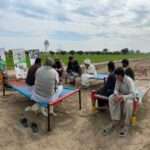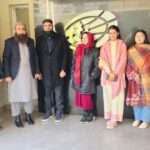News
Climate Smart Village Initiative (CSVI)
Building Climate Resilience in Pakistan’s Agriculture
Smallholder farmers are central to global food production, contributing nearly one-third of the world’s food supply while sustaining rural livelihoods and preserving agrobiodiversity. Yet, they are increasingly exposed to the hostilities of climate change—erratic rainfall, rising temperatures, floods, and droughts—that threaten yields, soil fertility, and water security. With limited access to finance, technology, and markets, smallholders remain highly vulnerable to these shocks.

Climate Smart Village Initiative (CSVI)
Top News
A promising pathway lies in collective action at the village level, where farmers work together to adopt climate-smart practices. The Climate Smart Village (CSV) model, pioneered and promoted by FAO and other partners, has demonstrated how coordinated, community-based approaches can enhance resilience, reduce risks, and improve food and income security. SAWiE and Bank Alfalah realized this importance and pioneered the launch of Climate-Smart Agriculture Village (CSV) initiatives in Pakistan, bringing farmers together and linking with the markets to scale regenerative practices. By pooling resources, sharing knowledge, and implementing innovations, smallholders can overcome individual constraints. Scaling such village-level initiatives is critical to empower farmers, strengthen climate resilience, and secure sustainable food systems for the future.
Smallholder farmers, the backbone of Pakistan’s agriculture, are most vulnerable to climate shocks, leaving them with limited resilience against floods, droughts, heatwaves, and pest outbreaks. In recent years, Pakistan’s food system has been hit by faster, more erratic swings between flood and drought, reducing recovery times and amplifying risks. Rising heat stress during critical crop stages is already causing yield losses in both food and fiber crops.
The CSA partnership organized a stakeholders’ conference on August 4, 2025 at Lok Virsa Hall, Karor (Layyah, Punjab). The conference attracted more than 250 stakeholders from government, academia, the private sector, financial institutions, NGOs, and farmer organizations.
This regenerative model integrates digital innovation, nature-based solutions, and green finance into a holistic framework. With three Climate Smart Villages already established in Rice-Wheat, Maize-Potato, and Cotton-Wheat systems, and 200+ farmers directly CSVI serves as a living lab for sustainable practices and inclusive climate solutions. Built around six core pillars.
The Six Pillars of CSVI
Water – Efficient irrigation (drip, AWD), mulching, raised-bed planting, irrigation scheduling
Healthy Soils – improving soil health through NbS solutions e.g. crop residue management compost, zero tillage, biochar, novel biofertilizers, etc.
Clean Energy – Solar irrigation, biogas digesters, energy-efficient irrigation
IPM and Biodiversity – Agroforestry, eco-friendly pest management(IPM), pollinator-friendly practices
Livestock – Improved fodder, rotational grazing, crop-livestock integration
Women & Entrepreneurship – Digital advisory, green finance, training & women-led enterprises
CSVI aims to empower smallholders not only with resilience but also with opportunities in climate finance and carbon markets.
Opening Plenary
- Welcome Note – Mr. Fritz Boehmler, CEO SAWiE
- The urgent need of CSA in Pakistan – Dr. Khalid Mahmood, Co-founder, SAWiE Ecosystems
Session 01: Climate Change Impacts on Agriculture and Adaptive Practices
- Sustainable Management of Cotton Pests in Pakistan – Prof. Dr. Shafqat Saeed (Dean, MNSUAM, Multan)
- Zero Tillage, Soil Health Improvement, and Novel Fertilizers – Prof. Dr. Abdul Wakeel, University of Agriculture Faisalabad
- Banking and Finance Pathways for Climate Resilience – Mr. Yahya Wahla, Agri Head, Bank Alfalah
Session 02: Scope 3 Emissions and Carbon Credit Opportunities
- Carbon Credits and Regenerative Agriculture Pathways – Dr. Tasneem Khaliq, Director Regenerative Agriculture, SAWiE
- Regional Perspectives on Scope 3 Emission Reduction – Dr. Ishaq, Asian Development Bank (ADB)
- Carbon Pricing Mechanisms & Export Market Opportunities – Dr. Ishfaq AhmaSession 03: Women’s Leadership and Inclusive Growth
- Youth and Women at the Heart of Climate-Smart Villages – Ms. Somia Atta Shahani, Member, Punjab Assembly
- Women’s Entrepreneurship in Rural Economies – Ms. Shakeela Bano, President, Women Chamber of Commerce, Layyah
- Reflections & Hosting – Ms. Aiman Aziz, Sustainability Executive, SAWiE
- Regen Agri in CSV and role of women- Ms. Sundas Abbas, Project Manager, SAWiE
Session 04: Cotton-Specific Discussions
- Farmer Perspectives on Cotton and Climate Challenges – Chaudhary Waheed Arshad, Ex-Chairman PCGA & CEO, Ittefaq Cotton Industries
- Cotton Value Chain Resilience and Advisory Services – Dr. Javed Hassan, Cotton Advisor, APTMA
Session 05: Partnerships and Institutional Support
- Financial Inclusion for Climate-Smart Agriculture – Mr. Muhammad Faheem Arshad, Deputy Director, State Bank of Pakistan
- Soil Health and Regenerative Practices for Climate Resilience – Prof. Dr. Ishfaq Ahmad Chattha, Vice Chancellor, Ghazi University, DG Khan.
- Promoting Climate-Smart Practices through Extension Services – Dr. Shuaib Kaleem, Deputy Director (SS), Adaptive Research Farm, Punjab Agri Department (Layyah Zone)
- Artificial Intelligence and Predictive Analytics for Climate-Smart Farming – Prof Dr. Muhammad Hanif, Ghulam Ishaq Khan Institute (GIKI)
- Olive Farming and Carbon Credit Opportunities – Mr. Mudassar Hussain, Farmer & Founder, Al-Zatoonia
- Climate Challenges and Resilient Farming in Balochistan – Dr. Samiullah Khan, Associate Professor, BUITEMS, Quetta
- Developing indigenous soil health improvement solutions– Ch Tariq Mahmood Lodhra Farmer and CEO HM Brothers biofertilizer.
The Way Forward
Expansion – Scaling CSVI with in the cropping systems and strengthening collaborations
Digitization – Enabling farmer cooperatives with advisory , market connectivity & carbon finance tools
Partnerships – Strengthening collaborations with universities, fintechs, insurers & development agencies, linking with traceable & sustainable sourcing markets.
Empowerment – Leadership and training for women & youth in regenerative agriculture
Farmer Participation
The event highlighted the voices of Cotton & Rice farmers, women entrepreneurs, rural youth, agritech providers who are ready to lead Pakistan’s transition to a climate-smart, regenerative, and inclusive agricultural future.



